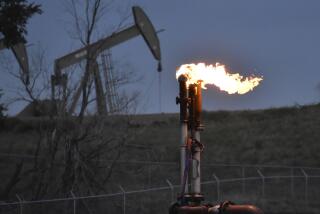90 companies worldwide produced fuels driving climate change
- Share via
WASHINGTON — Just 90 companies worldwide produced fuels that generated two-thirds of industrial greenhouse gas emissions from 1854 to 2010, according to a new study.
The 90 biggest producers of fuels driving climate change include investor-owned corporations, such as Exxon Mobil and Chevron, and state-owned oil companies, such as Saudi Aramco and Mexico’s Pemex.
The study attributes 914 billion metric tons of greenhouse gases to the fuels extracted by the companies, which is 63% of the total 1,450 billion metric tons of emissions estimated since the mid-19th century.
The study, published in the journal Climatic Change, also found that of the 914 billion metric tons, half was pumped into the atmosphere since 1986, a result of the rapid industrialization of the developing world. The journal focuses on the causes and implications of climactic change.
“This is the most complete picture we have of which institutions extracted coal, oil and natural gas and when,” said Richard Heede, the study’s author and head of the Climate Accountability Institute, a small research group in Snowmass, Colo.
“These are the companies and institutions that have created the products — used as intended — by billions of consumers that have led to persistently higher levels of atmospheric carbon dioxide and methane,” Heede said.
Emissions of carbon dioxide, methane and other greenhouse gases are generally tracked by country. Yet efforts to fashion binding international climate agreements have failed repeatedly, including at an United Nations climate meeting being held now in Warsaw that has grown increasingly acrimonious.
In the face of the diplomatic stalemate, the study focused on the companies that produce fossil fuels to prompt them “to become part of the solution rather than passive (and profitable) bystanders to continued climate disruption.”
Heede and his research team spent eight years tracing data about companies from international sources, like the United Nations Intergovernmental Panel on Climate Change, as well as corporate records for oil, gas and coal companies and cement producers. If a company was nationalized or acquired by a rival, the carbon production and emissions of the older company are attributed to the current one. The study did not examine carbon dioxide emissions from deforestation, agriculture or landfills.
The top five producers of fuels driving climate change over the last 150 years are Chevron, Exxon Mobil, Saudi Aramco, BP and GazProm, the Russian company that is the world’s largest natural gas producer. Two major U.S. coal and natural gas companies, Peabody Energy and Consol Energy, were among the top 20.
Shell, the sixth-largest producer in the study, said it considers the greenhouse gas effects of all major projects: “At Shell we advocate publicly and to governments that a strong and stable price on CO2 emissions will help drive the right investments in low-carbon technologies. We are producing more natural gas, the cleanest-burning fossil fuel, and we produce low-carbon biofuel. We are also helping to develop carbon capture and storage technologies, and working to improve the energy efficiency of our operations.”
The developed world, most notably the United States, has been seen as the main emitter of greenhouse gases until recently. But the study showed that the producers of carbon-rich fuel the world consumed include state-owned companies from many developing countries, such as the National Iranian Oil Co. Coal India, Petroleos de Venezuela and PetroChina.
Of the 914 billion metric tons of greenhouse gases the study analyzed, 89% of it was produced from burning the fuels the companies extracted. The remainder was emitted by the companies themselves, through natural gas flaring at wells, methane leaks and the energy used to run refineries and pipelines.
More to Read
Inside the business of entertainment
The Wide Shot brings you news, analysis and insights on everything from streaming wars to production — and what it all means for the future.
You may occasionally receive promotional content from the Los Angeles Times.











